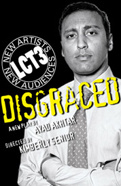How Hamlet Inspired Playwright Ayad Akhtar to Create a Magnetic Role for Aasif Mandvi in Disgraced
About the author:
Ayad Akhtar digs deeply into questions of identity, exploring the inner life of young Muslim-Americans and presenting his findings—warts and all—in an impressive variety of artistic forms. Akhtar co-wrote and starred in the 2005 feature film The War Within, which earned an Independent Spirit Award nomination for Best Screenplay. His recent novel, American Dervish, received a rave review in The New York Times. Now, Akhtar has penned a taut, riveting one-act play, Disgraced, which features a fascinating performance by Aasif Mandvi as an ambitious corporate lawyer who can’t escape his background. Asked by Broadway.com to describe the origins of his new play (now running at Lincoln Center Theater’s Claire Tow Theater), Akhtar revealed a surprising inspiration for the conflicted character played by Mandvi: Shakespeare’s prince of Denmark.
![]()
Five years ago, I saw a Hamlet that changed my life. The funny thing was it was just a reading of the play, not a full production. My friend Firdous Bamji had recently done Othello with director Karin Coonrod up in Hartford, and they were thinking of doing Hamlet together. The two of them gathered a group of New York’s finest theater actors for an afternoon delectation of one of Shakespeare’s greatest masterpieces.
From the first moments, there was something unusual about Firdous’ portrayal of Hamlet, something pliant, keen and vibrant; a subtlety despite the pitch; a wounded, precocious, ample vulnerability. It was as if I was seeing for the first time what I’d often read about the title role of the play: that Hamlet was the depiction of the human. I left the reading that afternoon profoundly inspired.
The experience stayed with me for months. I kept returning to the thought that this central role in the canon had been better portrayed by an actor of Indian origin than any other I had ever seen. (And I’d seen my share of famous Hamlets on stage and screen.) Which got me thinking about how drastically limited the roles are for talented actors of Indian and Pakistani ethnicity. Mostly shallow. Never expansive. And never leading.
Of course, Hamlet is one of the greatest roles written for the stage. But creative reflection knows no hubris, and I was alone long enough in my writing room to start kicking around an idea for a character inspired by Hamlet’s limitless expansiveness. I started to imagine an American, of Muslim origin, whose identity was fissured at the root, a man haunted by contradictions and vibrancies maddening enough to draw out every ounce of acting talent in a first-rate actor of Pakistani-Indian, even Middle Eastern, descent.
I see the American experience as being defined by the immigrant paradigm of rupture and renewal: rupture with the old world, the old ways, and renewal of the self in a bright but difficult New World. Even generations after the initial familial departure, Americans recapitulate this rupture and renewal in their own lives, with their families, with their communities. The remaking of the self seems to be the most essential of American journeys.
In Disgraced, Amir Kapoor has undertaken this central American crossing. He has separated from the old-world ways of his Muslim childhood, has adopted every inflection and attitude required to remake himself into the brilliant American success story that he is. A corporate lawyer living in Carnegie Hill on the Upper East Side. In a splendid apartment. With a beautiful and brilliant American wife. And yet, the price of his willful rupture from the past remains partly unpaid, for in a post 9/11 America, anti-Muslim prejudice will not allow the still glowing ember of his childhood to be snuffed out.
In the course of what I hoped would be a taut and compelling 90 minutes, the pillars of Amir’s identity would be knocked out from under him. He would move from being charming and brilliant to vulnerable and broken, expressing along the way the wildest of human oppositions: rage and empathy, narcissism, generosity, penetrating brilliance, heartbreaking and speechless confusion. I wanted to write a tragedy, which required a reversal of Amir’s fortunes due to some human flaw. In Amir’s case it would be denial. Denial of his Muslim heritage, which a post 9/11 America will not let him forget.
The long journey that began at a reading at New York Theater Workshop is over, as the play finally finds its way on stage at LCT’s Claire Tow Theater. It began with me watching one dear friend in a reading, and comes to completion with me watching another dear friend, Aasif Mandvi, bring the role to life. People know Aasif mostly from his hilarious turns on The Daily Show, but what many don’t know is just how supple and magnetic a dramatic actor he is. Whatever audiences make of the play, I feel confident they will feel many things for Aasif’s Amir: charmed and angered, confused by his choices, moved to compassion for his failings.
